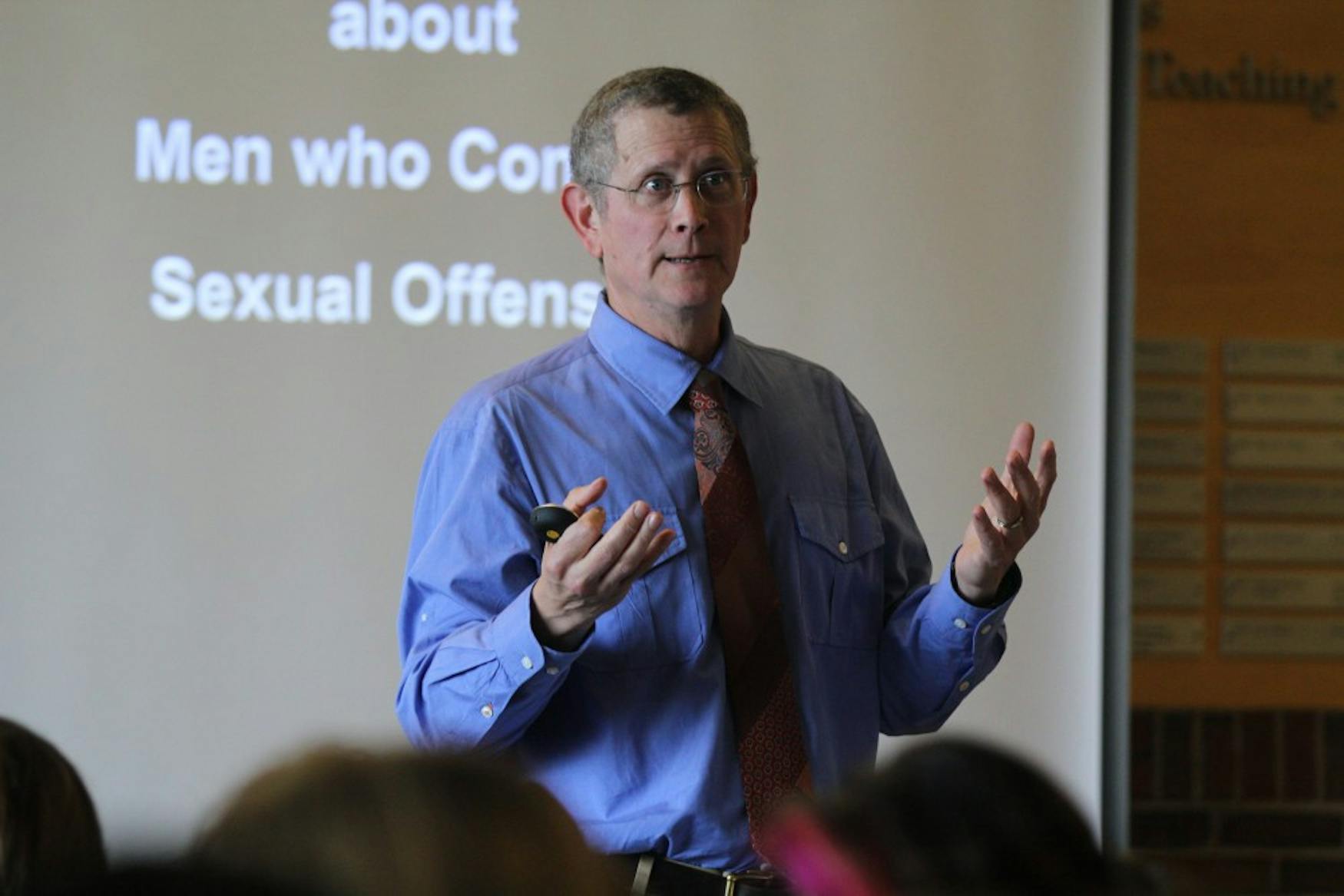Lisak addresses sexual assault
The Women’s, Gender and Sexuality Studies department’s 11th annual lecture in the Roosevelt Lecture Series underscored the importance of addressing the issue of sexual assault on college campuses and proposed ways in which it could be addressed. David Lisak, Ph.D., who has a background in forensic and psychological work, including many research credits and faculty positions, gave this year’s lecture, titled “Institutional Betrayal: Confronting the Epidemic of Sexual Violence on College Campuses,” last Thursday.
Prof. Deirdre Hunter (WMGS), who is a former officer at the Boston Area Rape Crisis Center, introduced Lisak. He spoke on sexual violence from both a psychological and a forensic perspective, describing it as a “planetary problem,” meaning that communities of humans throughout the world, regardless of location, experience the issue of sexual assault. “This is a universal problem in our species,” Lisak said.
Lisak is regarded in the sexual assault activist community for his research. One such well-known project is the “Frank” video, in which an actor re-enacts parts of an interview with a man who committed acts of sexual violence as a college student but was not prosecuted. The lines the actor speaks are from an interview that Lisak conducted in one of his noted research endeavors. Lisak spoke at length in his lecture about the history of sexual assault policy in higher education and the military.
Sexual assault in the military became a more prominent issue in 2003, when it was discovered that 12 percent of the women who graduated from the Air Force Academy had been victims of rape or attempted rape. According to a 2009 study titled “Report on Rape Reperpetration by Newly Enlisted Male Navy Personnel” by Stephanie K. McWhorter of the Naval Health Research Center and Cynthia J. Thompsen of Northern Illinois University, 13 percent of 1,146 individuals surveyed had committed acts that met the legal definitions of attempted and completed rape.
“Among those men, most (71 [percent]) reperpetrated attempted and completed rape incidents,” the study’s abstract shows. Lisak cited these statistics and mentioned that he believes that the military has made great strides in improving its handling of sexual assault. However, he said that there is still work to be done to improve the culture in the military toward sexual assault.
The statistics found in the Navy study hold true for college campuses as well, according to Lisak. Lisak said that the criminal justice system has failed victims of sexual assault because of the lack of discipline and lenient sentencing laws and practices in the system, leading victims to severely underreport their rapes.
College administrations have become responsible for adjudicating cases of sexual assault due to this failure, Lisak added. However, he noted that universities have also failed to handle sexual assault cases as they should, leading to underreporting at universities as well.
Students, he said, are a vital part of change to the way in which university administrations handle sexual assault because they “are very difficult to control.” Students can exert pressure on the administrations of universities and colleges to act, leaving administrations little choice but to make changes. Lisak spoke about how the next step in addressing sexual violence is through the criminal justice system because the issue of sexual assault policy has already been brought up in the context of the military and higher education.
Lisak referenced many studies in his lecture, notably a 2002 Boston-area study conducted by Lisak and Paul M. Miller of the Brown University School of Medicine in which 1,882 college-aged men were asked questions in order to determine if they had committed acts of sexual violence that had gone unreported. He presented the statistics gathered from the study and noted several points that the study brought up. Specifically, the study confirmed that previously-established national statistics which reveal the instances of sexual violence and reperpetration also applied to higher education.
The Boston-area study demonstrated that 91 percent of rapes studied were committed by serial rapists. These offenders, Lisak asserted, need to be “isolated and removed from the community” because their behavior cannot be changed. This can be done, according to Lisak, by making it clear that the culture on campus is one that is not accepting of sexual assault. Lisak said that victory in achieving the proper atmosphere would mean that “Brandeis is no longer a place where he/she [sex offenders] wants to troll for victims.”
Brandeis, like all college campuses, has a problem with sexual assault, but with enough commitment from the administration and students, it can be fixed, Lisak said.



Please note All comments are eligible for publication in The Justice.